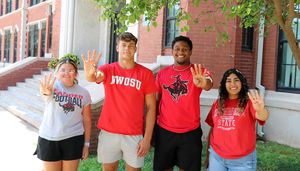Laken Riley’s tragic death unfolded earlier this year, leaving her community grappling with the loss of a bright future snatched away. The murder trial of Jose Ibarra, accused of killing the 22-year-old nursing student, commenced on November 15, 2024, at the Athens-Clarke County Superior Court. Emotions ran high as family members entered the courtroom, some choosing to step out to avoid the distressing visuals of Riley's injuries, which would be presented during the proceedings.
On the day Riley was murdered, she had embarked on her customary morning jog on the University of Georgia campus, unaware of the horror awaiting her. Prosecutors opened with impactful statements, describing how Ibarra, allegedly armed with a rock, brutally attacked Riley when she resisted his attempt to sexually assault her.
Laken Riley’s family expressed their heartache as they recalled her as not just the victim but as someone who fought fiercely for her life. Prosecutor Sheila Ross conveyed the gravity of Ibarra's actions, mentioning, “When Laken Riley refused to be his rape victim, he bashed her skull in with a rock repeatedly.” The courtroom was heavy with grief, and Riley's family openly wept as these harrowing details surfaced.
The prosecution revealed compelling evidence against Ibarra, including DNA found underneath Riley's fingernails, which allegedly belongs to him. This evidence encapsulates the tragic struggle she went through, evidencing her desperate attempt to fight back. Ibarra’s demeanor as he faced these accusations remained stoic, but the courtroom's atmosphere crackled with tension. He is charged with multiple felonies, including malice murder and aggravated assault.
One of the focal points during the trial outlined the importance of technology, particularly the data from Riley's smartwatch. Prosecutors highlighted how the device, gifted to her just prior to the incident, captured significant information about the time and nature of the events leading to her demise. According to Ross, around 9:10 AM on February 22, Riley initiated her phone's SOS function, indicating she was aware of the imminent danger she faced.
The smartwatch data significantly strengthened the case against Ibarra. It was noted, “She’s on this trail with this defendant for about four minutes, and then you see four minutes later, her Garmin moves 65 feet.” This information led authorities to reconstruct parts of the disturbing event, showing how quickly things escalated. Four minutes – the time it took for her routine jog to become her final breaths.
Ibarra, who is reported to have entered the campus wearing black attire and gloves, allegedly stalked for potential victims before encountering Riley. This premeditated aspect of his actions is expected to factor heavily during the trial, emphasizing the risks women face even within familiar environments like college campuses.
Riley was not only remembered as someone who fought valiantly but as someone with dreams and aspirations. A well-respected nursing student, just weeks earlier, she had been on the Dean’s List at Augusta University, continuing to prepare for her promising future. Her family, devastated by the loss, now seeks justice for her senseless murder.
The trial proceeds as the community remains engaged, with many advocating for conversations surrounding campus safety and the risks associated with violence against women. Riley's death has become part of broader discussions about violence and illegal immigration, especially as Ibarra is identified as an undocumented immigrant. These societal issues have sparked heated debates during the trial, drawing attention from local and national media.
Friends and family of Riley have stood vigil, wearing shirts bearing her face, symbolizing solidarity and remembrance. The emotional toll of being confronted with the graphical evidence and testimonies of her final moments is intense, as many are left to process their grief within the confines of the courtroom. This trial doesn’t just seek to address the legal proceedings; it embodies the quest for closure for those who loved her.
Through the course of the proceedings, witness testimonies are expected to outline more about Riley’s character, her life, and the impact this tragedy has inflicted on those who knew her. A major focal point is expected to center around discussions with her classmates and roommates, who shared intimate details of her aspirations and the despicable act of violence which took away her future.
The prosecution remains unwavering, presenting evidence of Ibarra’s actions as heinous and premeditated, hoping to outline the risks posed by such individuals to communities and campuses alike. The trial is poised to last for several days, and with it, all eyes will be on the outcome as Laken Riley’s memory hangs heavily over the proceedings. A reminder of not just one lost life but of the lives forever altered by violence. The days to come will likely paint the broader impacts of this tragedy on the community and influence discussions surrounding safety, justice, and the rights of victims.



